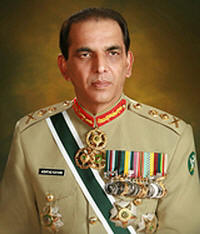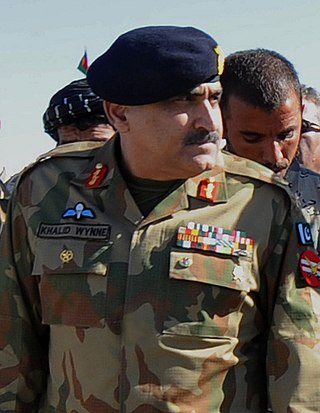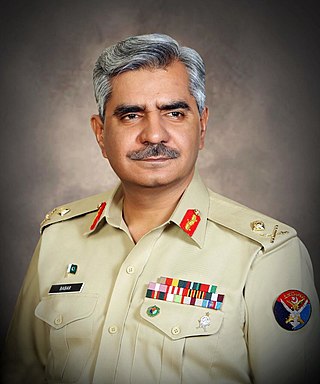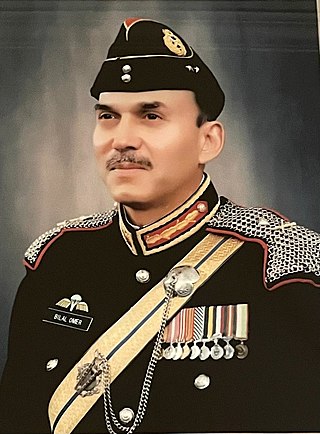Waheed Arshad, HI(M), Tbt, afwc, fsc(t), psc, is a retired three-star general in the Pakistan Army who served as the Chief of General Staff (CGS) at the General Headquarters from 2010 to 2013. His previous appointments at the GHQ include; IG Training and Evaluation (IGT&E), Vice Chief of General Staff (VCGS) and DG Planning at COAS Secretariat. Waheed Arshad also served as the chief Army spokesman heading the Inter Services Public Relations from 2007 to 2008.

The insurgency in Khyber Pakhtunkhwa, also known as the War in North-West Pakistan or Khyber Pakhtunkhwa War, is an ongoing armed conflict involving Pakistan and Islamist militant groups such as the Tehrik-i-Taliban Pakistan (TTP), Jundallah, Lashkar-e-Islam (LeI), TNSM, al-Qaeda, and their Central Asian allies such as the ISIL–Khorasan (ISIL), Islamic Movement of Uzbekistan, East Turkistan Movement, Emirate of Caucasus, and elements of organized crime. Formerly a war, it is now a low-level insurgency as of 2017.

The Battle of Wanna was a March 2004 military engagement between the Pakistan Army and members of Osama Bin Laden's al-Qaeda at Azam Warsak, near the South Waziristan town of Wanna. The army troops and intelligence paramilitary soldiers faced an estimated ~500 al-Qaeda foreign fighters holed up in several fortified settlements. The fighting ended with 17 soldiers dead.

Ashfaq Parvez KayaniNI(M) HI(C) HI(M) LoM LoH OMM, is a retired four-star general of the Pakistan Army who served as the eighth chief of army staff, being appointed on 29 November 2007 after his predecessor Pervez Musharraf retired from his military service and remained in the office until 29 November 2013.

Tariq MajidNI(M) HI(M) LoH is a retired four-star rank army general in the Pakistan Army who served as the 13th Chairman of the Joint Chiefs of Staff Committee from 2007 to 2010, the principal and highest-ranking military adviser in the Pakistan Armed Forces.
Muhammad Masood AslamHI (C) HI (M) SJ Imtiazi Sanad AFWC PSC is a retired three-star general who served in the Pakistan Army for 39 years. His last post in the Army was serving as the commander of the XI Corps, fighting TTP forces in the North-West Pakistan region from 2007 to 2010. He also held the post of Colonel commandant of the Punjab Regiment from March 2008 to April 2010. Masood played a key role in the management of crucial operations against the Tehrik-i-Taliban, including directing and commanding the First Battle of Swat, operations Zalzala, Sherdil, Rah-e-Rast and Rah-e-Nijat.

Khalid Shameem WynneNI(M), HI(M)(Urdu: خالد شمیم وائیں; 28 August 1953 – 30 December 2017), was a Pakistani four-star general who served as the 14th Chairman of the Joint Chiefs of Staff Committee appointed in 2010 until retiring on 8 October 2013.
General Khawaja Ziauddin Abbasi, also known as Ziauddin Butt, is a retired four-star rank army general in the Pakistan Army, who served as the Chief of Army Staff (COAS), for few hours, until Chairman joint chiefs General Pervez Musharraf reasserted the command and control of the military despite his termination on 12 October 1999.

[Ameer Faisal Alavi was a Pakistan Army two-star general and special operations expert who was the first General Officer Commanding (GOC) of the elite Special Service Group of Pakistan Army. A former member of Special Service Group, he was credited with masterminding the Angoor Ada operation in 2004, where many Arabs and Chechens based in the tribal areas were killed or arrested and turned over to the Americans.

The Operation Rah-e-Nijat was a strategic offensive military operation by the unified command of Pakistan Armed Forces against the Tehrik-i-Taliban Pakistan (TTP) and their extremist allies in the South Waziristan area of the Federally Administered Tribal Areas that began on June 19, 2009; a major ground-air offensive was subsequently launched on October 17. It became the integral part of the war in Western fronts which led to the encirclement and destruction of Taliban forces in the region, although the Taliban leadership escaped to lawless areas of neighboring Afghanistan.
Ehsanullah Ehsan is a former spokesman of Tehreek-e-Taliban Pakistan (TTP) and later Jamaat-ul-Ahrar. As a spokesperson of the groups, Ehsan would use media campaigns, social media networks and call up local journalists to claim responsibility for terrorist attacks on behalf of the groups. He was initially a spokesman for the Tehreek-e-Taliban Pakistan (TTP). In 2014, he left TTP after he had developed ideological differences with the TTP leadership following the appointment of Fazlullah as the leader of the group. He later co-founded Jamaat-ul-Ahrar and became its spokesman. In 2015, as a spokesman of Jamaat-ul-Ahrar, he condemned Fazlullah-led Tehrik-e-Taliban attack on a school in Peshawar.

The General Headquarters is the direct reporting and the command post of the Pakistan Army, located in the Chaklala at the vicinity of Rawalpindi, adjacent to the Joint Staff Headquarters.

Rashad Mahmood NI(M), is a retired four-star army general in the Pakistan Army who served as the 15th Chairman Joint Chiefs of Staff Committee. He was appointed as Chairman Joint Chiefs of Staff Committee of Pakistan by prime minister Nawaz Sharif on November 27, 2013. He retired on November 27, 2016.

Operation Zarb-e-Azb was a joint military offensive conducted by the Pakistan Armed Forces against various militant groups, including the Tehrik-i-Taliban Pakistan (TTP), the Islamic Movement of Uzbekistan, the East Turkestan Islamic Movement and Lashkar-e-Islam. The operation was launched on 15 June 2014 in North Waziristan along the Pakistan-Afghanistan border as a renewed effort against militancy in the wake of the 8 June attack on Jinnah International Airport in Karachi, for which the TTP and the IMU claimed responsibility. As of 14 July 2014, the operation internally displaced about 929,859 people belonging to 80,302 families from North Waziristan.

Asif GhafoorHI(M) is a retired three-star ranking general in the Pakistani Army, who most recently served as the president of the National Defence University uptill 2024. Previously, Ghafoor served as the Corps Commander Quetta and the 20th director general of the Inter-Services Public Relations (ISPR).
Faiz HameedHI(M) is a retired three-star general of the Pakistan Army, awaiting court martial. Faiz was the country's top Spy-master and served as the 29th Director General of the ISI from 2019 to 2022. He was commissioned in the Baloch Regiment having served as GOC 16th Infantry Division Pano Akil. He last served as Commander of the XXXI Corps before taking premature retirement on 10 December 2022.

Nadeem Raza NI(M), HI(M) is a retired four-star army general of the Pakistan Army who got commissioned in 10 Sind Regiment in September 1985. He served 17th Chairman Joint Chiefs of Staff Committee. Raza was previously the Corps Commander of the X Corps (Pakistan) and CGS and General Officer Commanding 9th infantry division, Wana and Commandant of the Pakistan Military Academy.

Babar IftikharHI(M) is a three-star general in the Pakistan Army. He was the former 21st director general of the Inter-Services Public Relations (ISPR) from 16 January 2020 to 6 December 2022. He was commissioned in the Pakistan Army in 1990. He is also former General Officer Commanding 1st Armoured Division in Multan. He is the current commander of V Corps of the Pakistan Army which has its headquarters in Karachi.

Sahir Shamshad MirzaNI(M)HI(M) is a four-star general in the Pakistan Army, currently serving as the 18th Chairman of The Joint Chiefs of Staff Committee appointed to the post on 27 November 2022. Prior to his appointment as Commander of X Corps at Rawalpindi, he previously served as 37th Chief of General Staff until he was succeeded by Azhar Abbas.

Bilal Omer KhanHI(M) SBt known affectionately as Billy was a two-star rank general in the Pakistan Army who died in the December 2009 Rawalpindi attack along with 39 others. He was posthumously awarded the Sitara-e-Basalat on Pakistan Day 2010. His cousin is the former Prime Minister Imran Khan.














